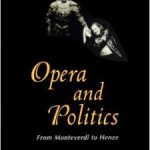In a single afternoon, and with a single announcement, multiple news outlets (
New Music Box, the
New York Times,
The Guardian and the
Los Angeles Times) had pieces cranked out that in their own individual ways, reported the definitive change to the Live in HD lineup set for the Metropolitan Opera during next year’s 2014-2015 season.
If you haven’t already heard, the change is as such:
The Death of Klinghoffer, by John Adams, an opera based on a real life event from 1985 when the Achille Lauro was hijacked, was cut from its November 15 slot on the program roster, for fears of stirring up anti-Semitic actions. Since the Live in HD streaming reaches theatres all over the world, including areas that have starkly more issue with this form of prejudice than others, the powers that be at the Met felt particularly wary and chose to play it safe.
It is all well and good that the Met is not wanting to see anyone get the wrong idea and start up some violent spree because of this opera. However, I say it is good in principle, much the same way one would say it is good that your average law abiding citizen does not abruptly turn around and start beating a puppy with a stick. The cornerstone stance of “We don’t want violence” is a clear cut statement but simultaneously about as much of a baffling justification for the Met’s decision as can be applied.
One might take a moment to recall the widely publicized fuss that came about in the time leading up to Eugene Onegin, (which I addressed in a
past piece) the opener to the recently ended 2013-2014 season. A newsworthy portion of the global LGBT community expressed discontent (to say the least) over the inclusion of cast and conductor who were deemed as something of 2
nd degree disapprovers to LGBT because of their political preferences in Russia and these sentiments were mixed in with the already hot topic of Russia’s touchy and disconcerting wording within national LGBT related legislation.
During that bout of controversy and dismay, General Manager Peter Gelb did not want to fold the hand of his company, reminding the world that the Met is not and cannot be a “vehicle for waging nightly battles against the social injustices of the world.” Now, Klinghoffer’s debatable issues are not directly comparable in the exact same social (in)justice framework and that may be where the point I am making appears to fall apart –because Klinghoffer depicts murder via terrorism and that’s not justifiable under any means. However, then we would need an examination of the distance between the lines drawn to designate when there is “too much social injustice” and “too much deplorable terrorization.” Then suddenly everyone might just find things just that much more taxing to sort through because the two are not always mutually exclusive. You can have social injustice without murder and you can have murder outside of a socially driven box.
The
individual wishes of Klinghoffer’s surviving daughters notwithstanding, it feels as though the decision to remove the opera from the world stage but to keep it running and viewable at the Met’s house in person, is like some kind of halfway solution and makes Gelb’s insistent sensitivity (which is painted with blatant contradiction thanks to Tom Service’s take posted by the Guardian,) feel even more disingenuous than if he had said nothing whatsoever. Knowing that this opera will still be performed and seen by a great number of people during its eight show run at the New York opera house makes its attempt at reducing flame fanning into a laughable paper tiger; the last of whose teeth are falling out –even with a statement by the Klinghoffer daughters included in the program.
It’s like saying, “We still want to put this opera on and make the emotional, artistic statement that Adams has put forth, hopefully inspiring thought and discussion on the nature of the human condition and conflict. Yet, we don’t want to put it anywhere near the people or places where the relevance would actually make affective, contemplation-inducing noise because said noise could be the killing type and that’s bad. We don’t like killing.”
Of course you don’t like killing, Peter Gelb.
The obvious aside, keeping the opera going in any capacity, given the stated apprehensions by third parties and Mr. Gelb’s expressed desire to cater to those sensitivities, also makes the background fuel sound a lot like this:
- Since the U.S. is not the nation, and is not even in the region of the world, with the primary socio-religious conflict in question, the Met holds less concern (at least less enough to avoid total cancellation) that the risked anti-Semitic behavior will arise from any New York based opera goers who see Adams’s rendition of Leon Klinghoffer’s death.
- Regardless of anything else, the Met is a business and if they cancelled the opera outright, a lot of time, labor, money, etc. would be lost and they do not need anymore preventable losses.
Last I checked, New York City was not immune to its share of irrational, demeaning and violent outbursts. Some person with latent anti-Semitic tendencies might get taken to the Met, see the opera and then go out and emulate said violence –but hey, this isn’t the Middle East, so, the chances of that happening are low enough that the remaining potential audience is clearly within the realm of kind and sane?
No, the US is not under the same degree of severe duress surrounding anti-Semitism as many people and nations in the Middle East but, there’s still plenty to write home about –especially in New York City, as the Anti Defamation League (the same group Gelb was working to come to sensitive compromise with over the HD transmission)
recently reported a rise in anti-Semitic attacks and assaults last year; as much as triple in the metropolis.
I understand that for many conflicts over the course of human history, whether it be surrounding schoolyard bullying over juvenile social ranking, gun control/shootings or anti-gay/women/(insert religion here), it is the minority, the fringe few that take things out of context and cause significant problems, that the powers that be in any given scenario must keep a peripheral eye on when making broadly affective choices that have the potential to end in violence. Nonetheless, it is sad to see an institution that, only so many months ago was not afraid to keep Tchaikovsky’s opera, alive on stage and in movie theatres, now making a retractive decision and showing a thought process that remains an ongoing achilles heel of humanity’s paradoxical propensity for, and toward, the concept of precaution:
Decisions around fragile subjects are often steered by the current societal driver that has a greater predilection for confidence in the insane‘s negative emotional reaction to something and as such, a predilection for trepidation surrounding the sane majority’s ability to receive, process and react to the same material in a way instead deemed either neutral or imminently productive and positive.
In this way, how we weigh one type of outcome over another truly feels more like a case of “two sides of the same coin,” as adversed to a set of lines drawn away from one another and completely lacking interconnection. Not even being able to see the specific financial data for the Met, (which in the general sense we know to be quite precarious at present,) and now returning to include the emotional preference of the Klinghoffers, I don’t believe there’s much else Gelb could have chosen to do that would not otherwise paint the Met as wholly insensitive.
It is the delivery of the institution’s choice and the outlining of its reasoning that give way to pause and brow-raising confusion. Those who are not looking to pursue violence are the ones left wondering and the dicey nature of this outcome will be a far more long lasting hit to our belief in the potential of art to communicate abstract feelings; especially if Adams’ opera, is branded in such the way that Service so eloquently put it,
“[the Death of Klinghoffer]– however you think of it, one of the most important of the late 20th century – [may be reduced] to yet another controversy…and fails to engage with the substance of the work…”
For anyone that is interested in some non-third party infused insight, here is the brief video preview/background explanation on The Death of Klinghoffer, as explained by John Adams himself, as well as the opera’s director, Tom Morris:





Leave a Reply